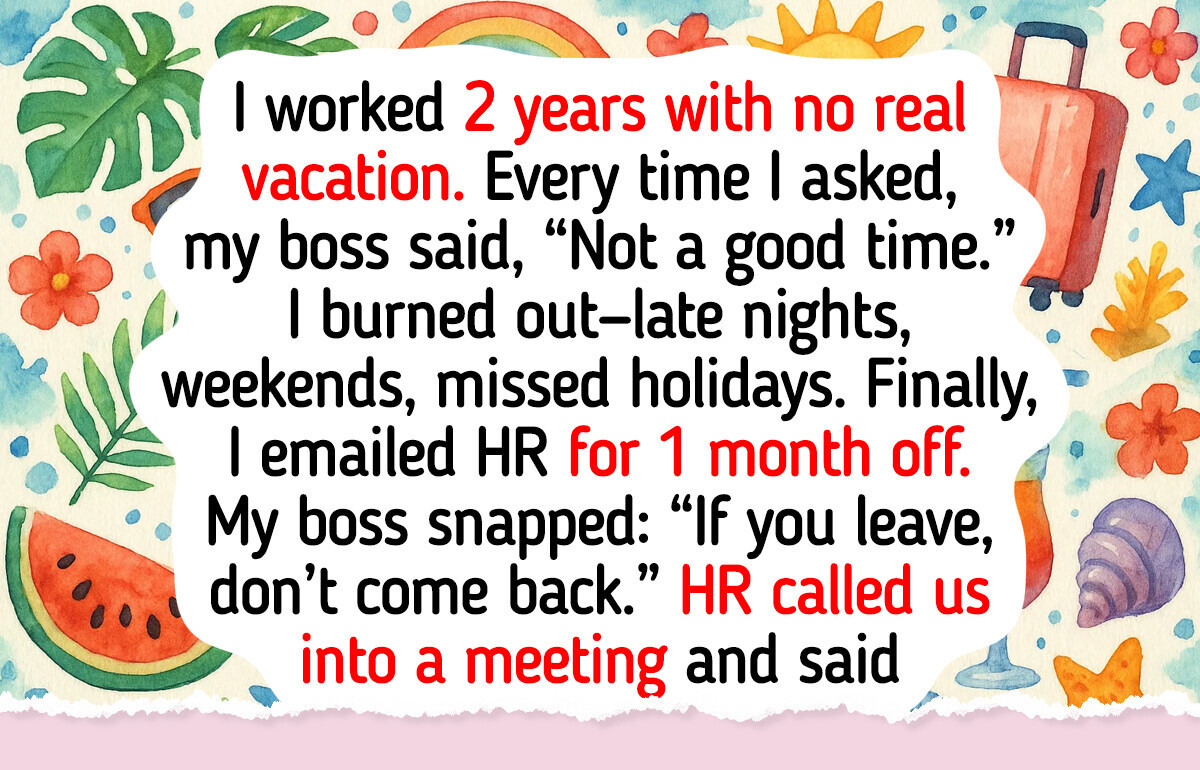I couldn’t never thought I was going to get my EX lover back but the moment I contacted Dr. Alaska I got her back within 48 hours. I saw Dr. Alaska on a group of United states so i visited his page and I saw he is spell caster so i decided to send him a message for him to help me bring back my wife so I texted him and i give him the reason why i text him and he said it shouldn’t bother me i am getting her back immediately i was so very happy Dr. Alaska arrange everything to cast a love spell on her that brought back my wife within 24 hours. She’s now with me. I’m very grateful to know Dr. Alaska. Thank you so much sir. Email: alaskaspellcaster44@gmail.com or text him on WhatsApp number: +233277283626
I Asked for Vacation—Now HR Is Involved

The letter:
Dear Bright Side,
Here’s my story. I’d been with my company for two years without taking a real vacation. Every time I brought it up, my boss would say things like, “Now isn’t a good time,” or “The team really needs you.” So I kept pushing through — late nights, weekends, even skipping holidays with my family.
Finally, I hit a breaking point. I emailed my boss and HR requesting 1 month off. My boss called me into his office the next day and flat-out said, “If you leave now, don’t bother coming back.”
I was stunned. I’d earned the time — it was legally mine. HR followed up, asking me to explain everything. I showed them my contract, the unused vacation days, and all the emails where my boss had delayed me.
A week later, HR scheduled a meeting with both of us. They told him point-blank that denying vacation days was against company policy — and the law. He had no choice but to approve my time off.
When I got back from my trip, I noticed a shift. My boss was colder, more critical, nitpicking my work. A few months later, he was the one who “asked to leave.” Turns out, I wasn’t the only one he’d pulled this on, and HR had been keeping track.
So yeah, I asked for a vacation — and ended up with way more than I expected.
Yours,
N.

When Your Boss Doesn’t Let You Take a Vacation.
Many employees hesitate to use their vacation days because they fear looking “less dedicated.” But here’s the truth: no matter how loyal you are, companies can let you go in a heartbeat. That’s why you should never sacrifice your entire life for work.
Taking time off isn’t laziness — it’s a basic right. Yet, some managers create guilt around vacations, especially when “unlimited vacation” policies come with hidden restrictions. Telling employees, “Take all the time you need,” but then frowning when they ask for three weeks off only creates confusion and stress.
Clear rules work better. If they say four weeks a year, employees won’t feel guilty for using what’s rightfully theirs, and managers can plan around it. Everyone wins.
So if your boss pushes back, don’t be afraid to ask: “What does unlimited vacation really mean here?” The answer might surprise you — and help you set the boundaries you need.

7 Smart Tips for Asking for Time Off:
Know your company’s rules. Read the PTO policy before you book anything.
Pick the right leave type. Vacation, personal, or sick? Be clear.
Plan ahead. More notice = more chances your request gets approved.
Put it in writing. A short, polite email is your safety net.
Offer solutions. Suggest how your tasks will be handled while you’re away.
Choose your moment. Don’t ask right before a big deadline. Aim for calm waters.
Stay flexible. If your boss says those dates are tough, suggest alternatives.
Simple Examples:
Formal email: “Hi [Manager], I’d like to request time off from [date] to [date]. I’ll finish all urgent tasks and coordinate with [colleague] while I’m away.”
Quick request: “Hey [Manager], is it okay if I take [date] off? I’ll make sure everything’s handled before then.”
Emergency: “Hi [Manager], I’m dealing with a personal matter and need the day off today. Thanks for understanding.”
Asking for time off shouldn’t feel like asking for a favor. It’s part of a healthy work-life balance — and you deserve it.
Comments
Related Reads
My Coworker Complained About My Hand Soap, and It Turned Into a Full-Blown HR Issue

I Refused to Let My Boss Install a Time-Tracking Software on My Laptop Because I Work Remotely

16 Touching Stories That Capture the Chaos and Beauty of Blended Families

12 Moment That Show Kindness Is the Glue That Keeps the World From Breaking Apart

13 Double-Life Stories That Prove Even Those Closest to Us Have Secrets

I Refuse to Save the Father Who Abandoned Me—Now Everyone Calls Me Heartless

15 Heart-Centered Moments of Human Kindness That Only Happen Once in a Blue Moon

23 Times Quiet Kindness Won Over Human Ignorance in the Best Way

I Refused to Follow My Boss’s Dress Code—HR Had to Step In

12 Heart-Touching Moments That Remind Us Workplace Loyalty and Empathy Don’t Pay the Bills

I Refuse to Talk to My Friends After They Tricked Me Into Eating Meat—I’m Vegan

I Refused to Be a Free Hotel for My Late Son’s Family: They Eclipsed My Life
